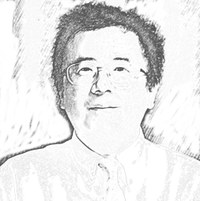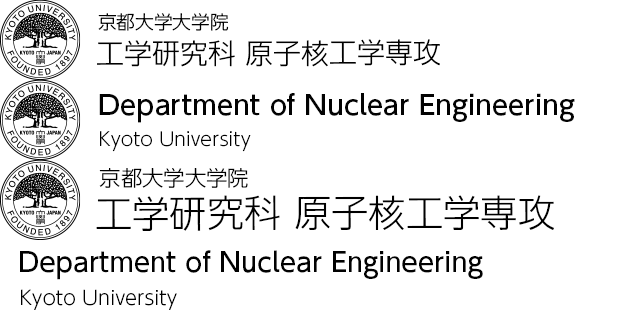Nuclear Materials
Energy security and environmental conservation are indispensable to realize a sustainable development of the world. Nuclear energy of nuclear fission and/or nuclear fusion is one of the suitable options for our country in view of its resources and an extremely low discharge of carbon dioxide. Nuclear energy is also expected as a method of providing hydrogen which is one of the future promising energy sources without any burden to the environment. For reliably safe and efficient utilization of this nuclear energy, nuclear materials are being studied in our group.
In the development and utilization of nuclear energy, radioactive wastes are managed carefully to achieve 'zero emission' to the environment, and advanced technologies are developed for decontaminating and recycling materials. These advanced technologies will also be useful for more general environmental restoration and conservation.
Academic Staff
Ikuji TAKAGI
 Professor (Graduate School of Engineering)
Professor (Graduate School of Engineering)
Research Theme
Plasma-wall interactions in long time operation of plasma, Tritium inventory and permeation in plasma-facing walls, Hydriding of LWR fuel claddings, Irradiation damages by ions and electrons
Classes
Fundamentals of Materials 1, Physical Chemistry of Materials, Nuclear Materials
Contact Information
Katsura Campus C3 Bldg. d2S12
E-mail: takagi@* (Add "nucleng.kyoto-u.ac.jp" after @)
http://www.nucleng.kyoto-u.ac.jp/people/ikuji/
Takayuki SASAKI
 Professor (Graduate School of Engineering)
Professor (Graduate School of Engineering)
Research Theme
Basic solution chemistry of actinides and fission products to perform the safety assessment of radioactive waste disposal, and to develop the efficient and advanced waste treatment. Research is mainly focused on solubility, complexation, sorption, and their thermodynamic modeling.
Classes
Introduction to Nuclear Engineering 1 and 2, Radiochemistry, Nuclear Fuel Cycle 1
Contact Information
Katsura campus, C3-d2S10
E-mail: sasaki.takayuki.2a@* (Add "kyoto-u.ac.jp" after @)
Taishi KOBAYASHI
Associate Professor (Graduate School of Engineering)
Research Theme
For the safety assessment of radioactive waste disposal, research is focused on the solubility, complex formation, and colloids of actinides and radionuclides.
Contact Information
Katsura campus C3-d2S11
E-mail: kobayashi@* (Add "nucleng.kyoto-u.ac.jp" after @)
Research Topics
Reliably safe and efficient utilization of nuclear energy resources
Nuclear fuel, uranium, is a limited resource for generating electrical energy as the same as the petroleum and coal of thermal power generations. It can be utilized more effectively and efficiently by recycling. In order to establish advanced nuclear fuel cycle of 'zero emission', physicochemical properties and chemical processing of nuclear materials are being studied.
As well as generated electrical energy, radioactive wastes of fission products and reactor materials are produced from nuclear power plants. In order to assure the long term safe isolation of these radioactive wastes in deep underground repositories, technological methods and databases are being studied.
These studies are not only important for nuclear energy utilization but also for more general recycling chemistry and technology which are needed to establish the recycling-based society. Such databases of urgent need as for the environmental safety assessment of radioactive waste repositories are expected to provide some important knowledge for the environmental conservation from heavy metals and environmental hormones.
Performance assessment and improvement of nuclear energy materials
In light water reactors, neutron irradiation introduces various types of defects to structural materials and mechanical and thermodynamic properties of the materials become changed. In addition, irradiation would enhance corrosion by high-temperature water. In our laboratory, experimental studies on radiation damages and corrosion are conducted for understanding the related mechanisms and for improving safety of the nuclear materials.
In fusion reactors, physicochemical behavior of hydrogen particles is one of the key issues of the reactor engineering. Hydrogen ions and atoms from plasma wear plasma-facing walls by physical and chemical sputtering. Retention of tritium, a radio isotope of hydrogen, in the walls degrades the tritium-breeding ratio and cause tritium leakage by permeation phenomena. These behaviors are experimentally studied to know some rate constant of basic processes by use of a small plasma device and a Van de Graaff accelerator.
Separation chemistry for advanced recycling systems with reduced environmental burden
Economical and ingenious reprocessing of nuclear fuels needs to reduce the amount of radioactive wastes, and several recycling technologies have been proposed for more efficient utilization of nuclear energy. These technologies are based on many experimental and theoretical databases on chemical separation and purification of uranium and plutonium from spent fuels.
In order to establish the principle of an advanced recycling system using new reactants, fundamental data are being accumulated in solution chemical studies. Not only ordinary analytical equipments but also such radiation facilities as accelerators and neutron diffraction systems are used to characterize chemical compounds and to resolve reaction mechanisms.
